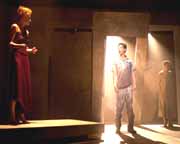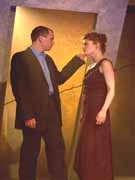
Paulanne Simmons
A Woman Scorned
Directed by Steven Little
Presented by 71AC Productions
Rattlestick Playwrights Theater
224 Waverly Place between Perry and W. 11th St.
Through Sept. 4, Tues.- Sat. at 8 p.m. Sat. and Sun. matinees at 3 p.m.
$35, SmartTix (212) 868-4444 or visit www.smarttix.com
Reviewed by Paulanne Simmons, June 9, 2004
 |
| Sean Haberle
in the new play "Medea In Jerusalem" by Roger Kirby. Photo Credit: Benjamin Heller. |
In "Medea," Euripides' first surviving drama, the great tragedian parted company with Aeschylus and Sophocles.
Unlike his predecessors, who believed the gods were holy and just, he presented the gods as neither good nor evil, but rather the embodiment of man's existence - like the sun, the rain and the wind, they may nurture him or destroy him.
The pious man recognizes these facts and behaves accordingly; the proud man ignores them and suffers the consequences. Thus Jason, a sophisticated Greek who marries the sorceress Medea and then rejects her in the name of civilization, is punished for his arrogance when Medea murders their children.
 |
| L to R: Jennifer McCabe as Sister and Rebecca Wisocky as Medea in the new play "Medea In Jerusalem" by Roger Kirby. Photo Credit: Benjamin Heller. |
In Roger Kirby's "Medea in Jerusalem," presented by 71AC Productions at Rattlestick Playwrights Theater, the gods are nowhere in sight. Instead it seems to be current events that influence the tragedy.
In Kirby's play there is no chorus of concerned citizens. In their place, a radio, effectively lit by a beam of light, broadcasts the latest horrendous news from the Middle East. The Israelis have killed x number of people. The Palestinians have killed y.
Medea was produced in 451 B.C. at the beginning of the long war between Athens and Sparta. By this time Athens had defeated the Persians at Salamis and was becoming a great power among the Greek states. The national policy of selfless heroism was quickly shifting to one of selfish greed. For Euripides, Jason was an apt symbol of that shift.
 |
| Rebecca Wisocky as Medea in the new play "Medea In Jerusalem" by Roger Kirby. Photo Credit: Benjamin Heller. |
Kirby's play is produced in the middle of a long conflict in the Middle East that has remained intractable for over fifty years. During that time neither side has achieved hegemony, though some believe Israel now has the upper hand.
But to see in Kirby's Medea in Jerusalem a similar condemnation of Israeli national pride in this Jason's dedication to personal advancement would be to ignore Kirby's ambivalent text and director Steven Little's sensitive interpretation.
Kirby's Medea, like Euripides', is sympathetic, frightening and repugnant all at once. Rebecca Wisocky is brilliant in her chameleon-like changes. With flaming red hair to match her passions, Wisocky roars like the caged animal she is.
Although Medea's sister (Jennifer McCabe), Jason's brother (Ariel Shafir) and Jason's lawyer (Miller Lide) all caution moderation, Medea's fury cannot be contained. Considering Jason's (Sean Haberle) lame excuses and promises (it will be
 |
| (L-R) Rebecca Wisocky as Medea, Ariel Shafir as Brother and Jennifer McCabe as Sister in the new play "Medea In Jerusalem" by Roger Kirby. Photo Credit: Benjamin Heller. |
better for the family, if you behave you can stay in Israel) it's hard to blame Medea for her outrage when her husband decides to take a new wife. As Jason himself admits, what woman wouldn't be upset? But it's equally hard to condone her actions.
Nevertheless this reviewer would have liked to see Haberle conjure up a bit more sympathy for his character. At times his arrogance translates into mere stiffness, in an otherwise fine performance.
 |
| (L-R) Sean Habele as Jason and Rebecca Wisocky as Medea in the new play "Medea In Jerusalem" by Roger Kirby. Photo Credit: Benjamin Heller. |
Kirby's text has many poetic moments. But they don't save his dialogue and monologues from occasional repetition. The stakes may be high, but there are moments when the audience seems to be witnessing a typical marital spat, with all it redundant accusations, despite the actors' magnificent delivery.
Fortunately, Little's excellent staging and Nicolai Hart-Hansen's powerful scenic design invariably bring the play back to its tragic core. The granite walls are effective reminders of the characters' granite wills. And the crack that runs through the walls (sometimes coordinated with the line running through Medea's gown) is symbolic of the fault in the souls of men and women and the world they live in.
In the end, Medea in modern Jerusalem is remarkably faithful to Media in ancient Greece. Neither one presents any easy answers. And both leave the audience with the uneasy feeling that there may be no answer at all. [Simmons]

| museums | NYTW mail | recordings | coupons | publications | classified |